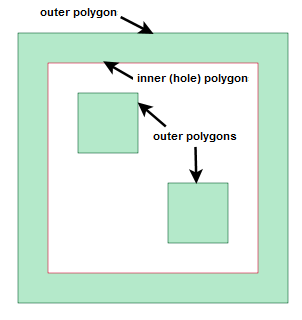 Home Home
|
 ClipperLib ClipperLib
|

|
PolyTree
Hierarchy
|
PolyTree is intended as a read-only data structure that should only be used to receive solutions from clipping and offsetting operations. It's an alternative to the Paths data structure which also receives these solutions. PolyTree's two major advantages over the Paths structure are: it properly represents the parent-child relationships of the returned polygons; it differentiates between open and closed paths. However, since PolyTree is a more complex structure than the Paths structure, and since it's more computationally expensive to process (the Execute method being roughly 5-10% slower), it should used only be when parent-child polygon relationships are needed, or when open paths are being 'clipped'.
An empty PolyTree object can be passed as the solution parameter in Clipper.Execute and in ClipperOffset.Execute. Once the clipping or offseting operation is completed, the method returns with the PolyTree structure filled with data representing the solution.
A PolyTree object is a container for any number of PolyNode children, with each contained PolyNode representing a single polygon contour (either an outer or hole polygon). PolyTree itself is a specialized PolyNode whose immediate children represent the top-level outer polygons of the solution. (Its own Contour property is always empty.) The contained top-level PolyNodes may contain their own PolyNode children representing hole polygons that may also contain children representing nested outer polygons etc. Children of outers will always be holes, and children of holes will always be outers.
PolyTrees can also contain open paths. Open paths will always be represented by top level PolyNodes. Two functions are provided to quickly separate out open and closed paths from a polytree - OpenPathsFromPolyTree and ClosedPathsFromPolyTree.

|
polytree:
Contour = ()
ChildCount = 1
Childs[0]:
Contour = ((10,10),(100,10),(100,100),(10,100))
IsHole = False
ChildCount = 1
Childs[0]:
Contour = ((20,20),(20,90),(90,90),(90,20))
IsHole = True
ChildCount = 2
Childs[0]:
Contour = ((30,30),(50,30),(50,50),(30,50))
IsHole = False
ChildCount = 0
Childs[1]:
Contour = ((60,60),(80,60),(80,80),(60,80))
IsHole = False
ChildCount = 0
|
Reference
| Methods | Properties |
|---|---|
| In PolyTree: | |
| Clear | Total |
| GetFirst | |
| In PolyNode: | |
| GetNext | ChildCount |
| Childs | |
| Contour | |
| IsHole | |
| IsOpen | |
| Parent | |
See Also
Overview, Clipper.Execute, ClipperOffset.Execute, PolyNode, ClosedPathsFromPolyTree, OpenPathsFromPolyTree, Paths
Copyright ©2010-2014 Angus Johnson - Clipper 6.2.0 - Help file built on 1-November-2014